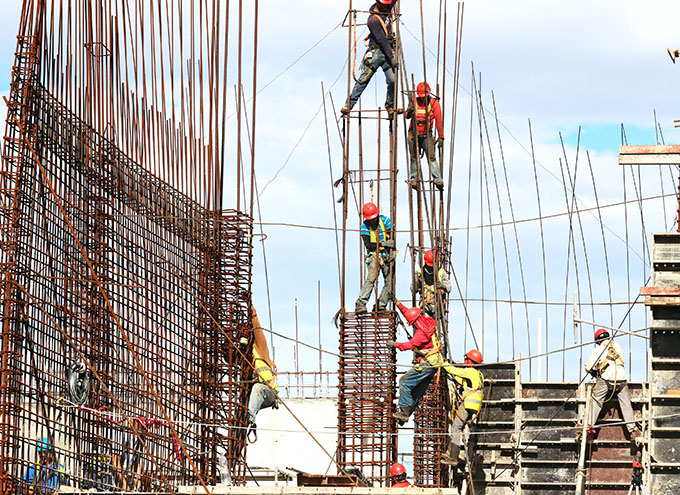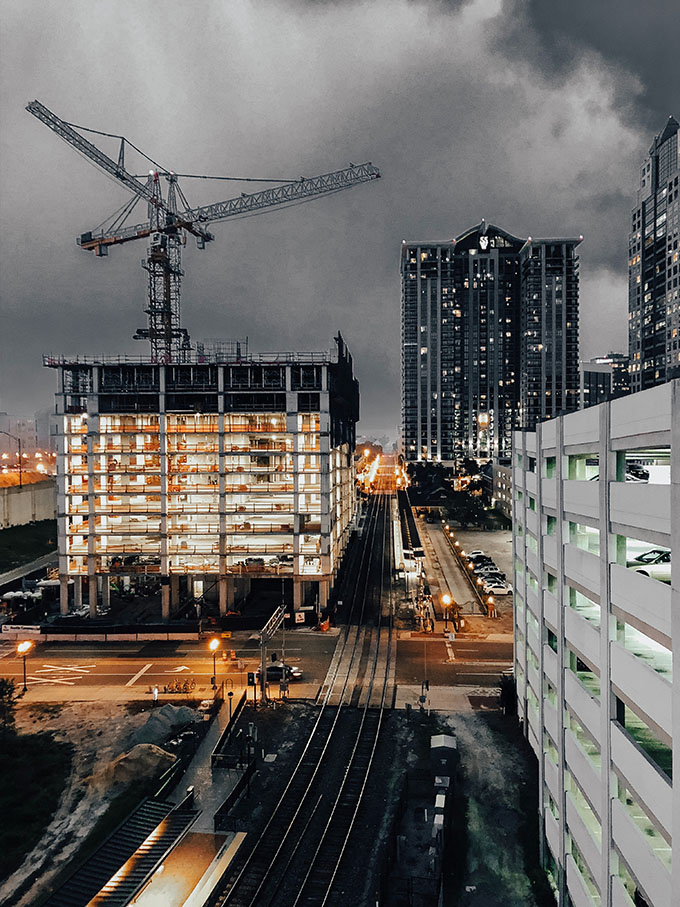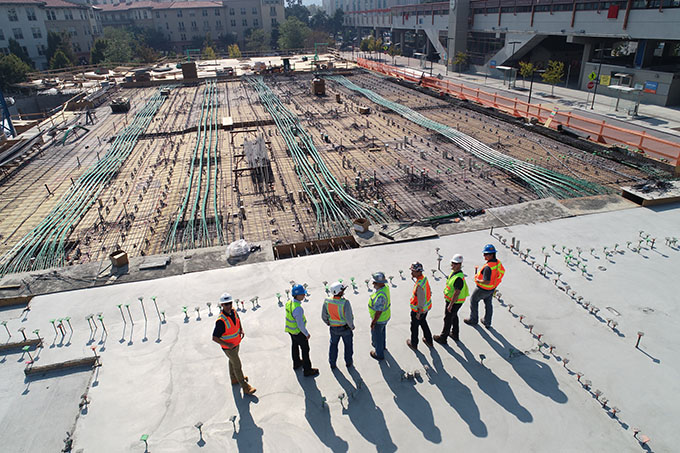
The construction sector in the United States creates $1.3 trillion worth of structures every year. This figure translates to around 6.36% of the total GDP. With the changing technological landscape, the sector will continue to expand in the next five years.
Change is the only constant in the modern construction industry. It’s essential to keep track of the changing dynamics in the sector if you want to remain relevant. This is especially considering the technological revolution in the field.
The construction sector isn’t what it used to be a decade ago. With new construction technologies, the quality of modern buildings will continue to experience significant improvements. Could you be wondering what new construction technologies will shape the sector going forward?
Here are the top trends to look out for in the construction sector.

New Construction Technologies to Consider
If you’re a player in the construction industry, keeping up-to-date with current trends will work to your advantage. The changes will have a lasting implication on the expected quality standards.
These nine trends form part of the sector’s advancements, and you should be aware of going forward.
-
Augmented Reality
The uses and benefits of augmented reality will change the way the construction sector functions in the future. More companies are coming to terms with the vital role that augmented reality plays in the sector. AR will soon replace virtual reality in the determination of future construction trends.
You’ll likely change how you approach future construction projects with AR. The technology helps you to visualize the real world through a camera lens.
Augmented reality comes at a cost. However, the benefits are satisfying.
The technology introduces levels of accuracy that ensure top-notch project quality. It’s possible to provide accurate construction measurements with augmented reality,
Are you looking for new construction technologies that can help you save money? You’ll save money and time as you embrace AR. The technology saves you the burden to create unique architectural plans for each client’s requirements.
With augmented reality, you’ll be able to achieve high standards of project management. You can also derive more significant levels of effective collaboration. AR ensures better communication ideas, and creativity in designs.
In the end, AR helps to turn client visions into useful models.
-
Wearables
It will be the norm rather than the exception to see more construction managers utilizing wearables in the future. Safety standards will improve with the rise in apparel and personal protective equipment. Are you wondering what new construction technologies to look out for in the future?
Wearables will be among the must-have safety considerations. The modern construction industry will witness wearables fitted with biometrics. These innovations will also have fixed environmental sensors.
Companies in the industry will utilize a wide range of gadgets. The gadgets include location trackers, voltage detectors, and other sensors. The devices will function as a monitoring tool.
With these new developments, there’ll be fewer slips and falls in the sector. Introducing wearables into the industry will also ensure constant assessment of repetitive motions and postures. The evaluation will help in the improvement of health and safety outcomes.
One of the most significant benefits that wearables will have in the construction sector will be to change the scope of safety. This new construction technology will help ensure the supervision of all restricted or hazardous areas. With a combination of alarms and lights, safety will no longer be a concern.
Are you wondering what safety options you can consider in all your construction sites in the future? With smart clothing as part of modern wearables, you’ll be able to monitor respiration rates. You can also check the temperature and heart rates for all your workers on site.
Are you considering new construction technologies to ensure safety during project management? Then wearables should be top of your list.
-
Drones
Inspection and monitoring are critical functions during project management in the construction sector. Even so, these functions face limitations. More so, when you have limited supervisors to oversee the process.
One of the significant emerging innovations in the construction sector is the introduction of drones.
Are you making full use of crewless aerial vehicles so far? If not, then you are yet to experience new levels of construction inspection and monitoring. Drones are changing how construction and project managers approach inspection and survey.
With drones, you can now keep up with accurate information on the project schedules and available resources.

Lower Project Management Costs
You can now cut on costs when undertaking multiple projects simultaneously with the assistance of drones. This new construction technology allows you to capture real-time images from the field in numerous locations. With such an advantage, you can cut on costs while keeping up with all the ongoing projects.
Improved Communication
Communication is an integral part of project management in the construction sector. The future will involve a greater dependence on drones. Unarmed aerial vehicles will help to keep up with fast and effective communication needs.
You’ll experience higher levels of efficiency going forward. This is especially with the option of video footage and on-the-spot surveillance
Enhanced Security
Most of the construction companies decry the extent of security concerns they grapple with when overseeing projects. Are you looking to utilize technology to enhance protection against theft and vandalism? Well, with drones, this matter is no longer one of concern.
With modern drones, you can now monitor your site. The move helps ensure full time tracking to ensure vigilance against instances of theft and vandalism. If you are keen on improving security, you can rest assured that drones will offer the best option.
Up-to-Date Visual Data
Drones may also be useful when capturing 3D models to help provide clients with detailed reports on the progress of the projects. With the low cost of drones, visual data is now achievable through 3D modeling.
In the past, project management witnessed limitations in collecting visual data. The restrictions were due to the prohibitive cost of hiring helicopters.
With the new construction technology’s ability to enhance the quality of buildings, you can rely on drones to ensure project progress tracking. At Dr Drone, you can learn about the use of drones in construction project management, inspection, and monitoring.
With such information, you’ll no longer face the prohibitive aspect of costs due to the variety of drones in our store. All you need is a drone that fits your specific needs and budget.
-
Autonomous Robots
Robotics has become the latest construction technology sensation in the building sector. One of the most significant challenges to construction is the high labor costs in the industry. If you have been facing labor shortages in the past, then you aren’t alone.
Labor costs pose a significant barrier to efficiency in modern construction. But with autonomous robotics, the future of construction is bound to change for the better.
Are you looking for advanced construction systems to help you achieve safety, efficiency, and reduce liability? Then autonomous robots are the solution.
With autonomous construction equipment, you don’t need an operator. This reduces both the cost of labor and the liability on your back in case of injury. Major automakers have been on the front line in the development of robotics in the construction sector.
You no longer need a human hand in the handling and manipulation of bricks and other massive blocks. These robotics can dispense concrete on the jobsite with minimal supervision. Given the ability to automate, robotics are accurate.
Are you looking to match up when it comes to quality and completeness in your projects? The future of the construction sector will depend more on robotics and the many advantages they present.
This means that the next few years may experience greater extents of automation. The prediction is plausible as the sector embraces modern autonomous equipment.
-
Internet of Things
Today, multiple objects or machines in the construction sector can operate within a network of internet-connected systems. This interconnection makes it easy to share and exchange information with other site managers and workers. Such information is accessible by other “things” such as autonomous robotics in the completion of set functions.
The internet of things allows multiple physical devices to function within a network. The decisions in such systems depend on the proper analysis of data. Smart objects and equipment in the industry have embedded sensors and network connectivity to allow remote operations.
You can now achieve reliable equipment service and repairs through the internet of things. This will have a positive impact on the sector through the creation of efficient and responsive buildings. The link between robotics, wearables, and drones will depend significantly on the IoT.
-
Machine Learning
The construction sector is witnessing unprecedented shifts in operations. The trends are notable as more companies embrace machine learning as a critical trend in the industry.
Are you keen on increasing productivity, improving jobsite safety, and reducing risks? Then machine learning systems can help you get there.
Machine learning plays an essential role in the prediction of future outcomes in the sector. Machine learning will have vast potential applications in the industry. With smart assistance through machine learning, your teams can now identify the critical risks affecting performance.
Such information helps in improving safety and quality standards. With machine learning, you can have improved quality of construction designs. You’ll also enjoy a safer jobsite with this new construction technology.
-
Mobile Technology
In 2019, more than 71% of adult Americans owned smartphones. The construction sector will benefit from this changing scope of mobile technology in the future. This assumption premises on the changing patterns in mobile phone ownership.
One of the advantages of mobile tech to the construction industry will be an increase in the use of mobile apps. The apps will be useful to support communication and collaboration.
Most of the new construction projects will rely on smartphones and mobile apps to make project management more effortless. You’ll no longer have to make those impromptu meetings to deal with urgent but less critical issues. With mobile technology, you can reach definitive conclusions on essential matters without needing to meet.
Smartphones will also make communication in real-time possible. Such ease of communication will make job-site decision making easy. The technological advancements will also introduce integrated solutions.
Stakeholders can now add notes, modify architectural designs, and respond to RFIs on the go. Such extents of flexibility in operations will make information sharing easy. Your construction company will thrive more once you embrace mobile technology.
-
3D in Construction
With the evolution of 3D, the construction sector is set to reap significant benefits. This is due to the better visualization of the subject during construction. Such imagining will ensure accuracy and flexibility.
With 3D scanning, printing, and photogrammetry, you’ll incur fewer costs on future project management. Photogrammetry will become a common low- cost alternative to laser-based scanning. This is more so as many construction companies find new ways to capture and process data.
3D scanning will also ensure accurate means of collecting large volumes of measurable data points. The technique will have a significant impact on construction accuracy and the sharing of data sets.
More construction companies will rely on 3D printers to produce high-quality prototypes of designs. This will save significant construction costs and reduce material wastage.
You can rely on this technology to ensure accurate construction processes. The trickle effect will be lower labor and production costs.
-
Building Information Modelling
The construction sector will derive benefits from the use of BIM. The observation is especially so in the optimization of the many construction procedures in the industry.
With BIM, there’ll be notable changes in the way construction companies undertake processes. BIM will change how you design, build, and complete various projects.
The tech uses a wide range of tools, tools, and models. These tools help to achieve specific insights that improve efficiency in the design of structures.
BIM ensures that appropriate information is available. The data must also be in the most suitable format and at the right time. Such a move helps to enhance the decision-making process.
With BIM technology, current construction projects will benefit from accurate information. The insights will improve quality delivery.
With New Construction Technologies, Your Scorecard is Bound to Improve
The construction sector will never be the same again. The changing scope of technology will have a lasting effect on the industry.
With the advent of new construction technologies, your job-site will be safer. You’ll also witness improved efficiency given that decision making will rely more on technology.
Your construction company will achieve increased productivity in the future. However, this depends on your keenness in embracing these new construction technologies.
Do you want a result-driven project management process? Don’t be left behind as more construction companies embrace drones and other construction innovations.
Was this article useful? Keep reading to explore more content.



